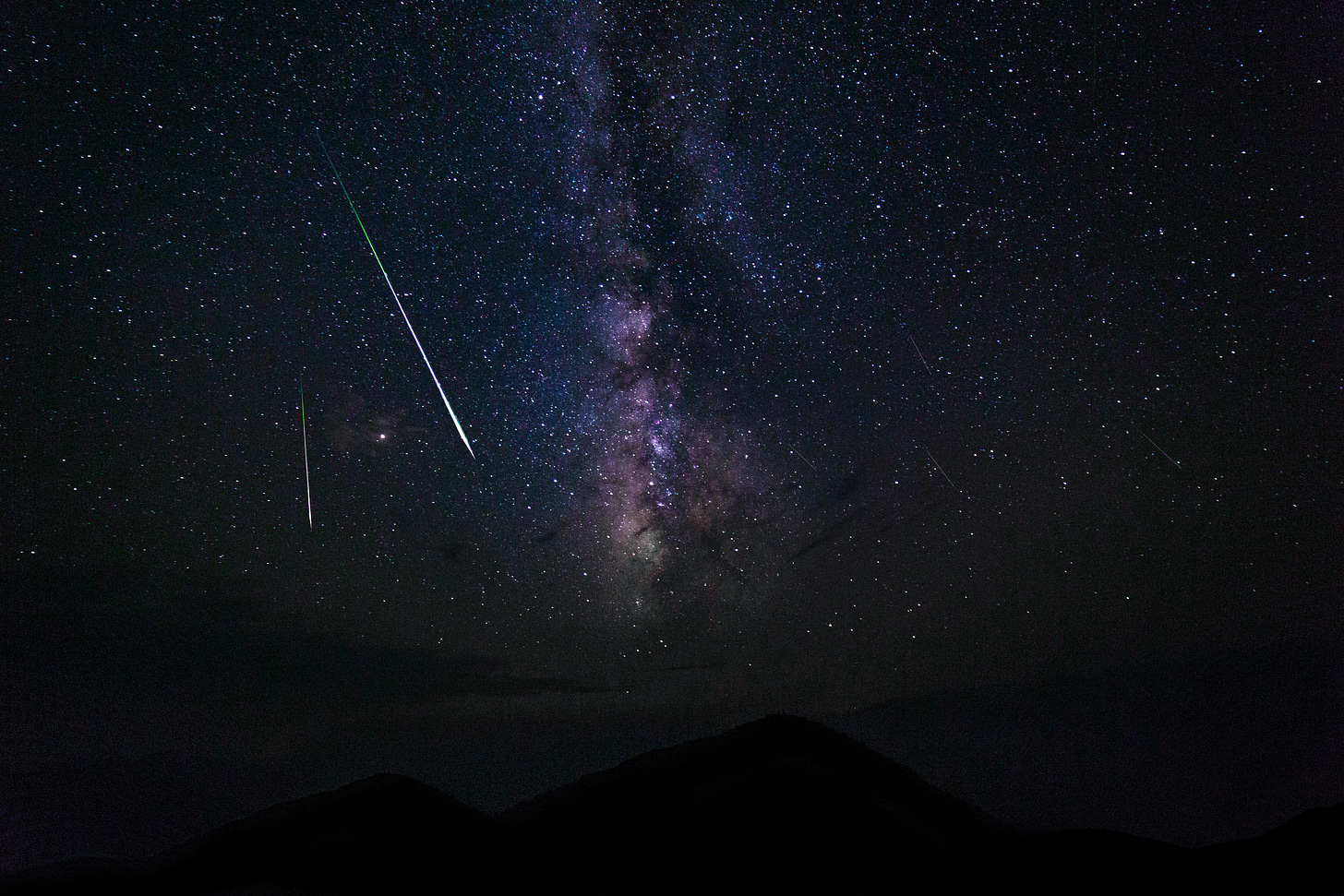In search of the "overview effect" on Earth
Carl Sagan, Marjolijn van Heemstra and a meteor shower happening in a night sky near you.

A few nights ago, I sat out on our balcony for a bit of fresh air before bed. The August heat has arrived where I live in the Italian Alps and at night the beat of crickets blends with traffic and church bells.
I was, quite honestly, scrolling through my phone, when I happened to look up and saw a large shooting star sweep across the night sky, like at the start of a Disney movie. I jumped up, ditching my phone, the sky now a much more fascinating form of entertainment. I’d never in my life seen a shooting star like that.
It turns out what I saw was part of the Perseid meteor shower, which is happening until 24 August across the Northern Hemisphere. It takes place every summer and is set to peak today (12 August) — so get out there this evening!
So often, we miss awe-inspiring events like this. Glued to our phones, running from work to the school run to the gym to dinner, we rarely pause to take in what’s around us. Everything feels urgent and important: that email that needs dealing with; that report that needs writing; that cupboard that needs fixing; that bill that needs paying. Stuck at our desks, or running on the commute, sometimes it can be hard to find perspective.
“The Earth is a very small stage in a vast, cosmic arena.” Carl Sagan, Pale Blue Dot
In her book In Light Years There’s No Hurry: Cosmic Perspectives on Everyday Life, Dutch writer Marjolijn van Heemstra asks whether it’s possible to view the Earth through the eyes of an astronaut and experience what’s been dubbed the “overview effect” here on Earth. Exhausted by daily obligations, endless notifications and dismal news, she longs for a renewed sense of meaning and embarks on a year-long quest to experience the overview effect without all the bother of going to space. Van Heemstra writes:
“Lately, it’s like I can focus only on the chaos occurring at eye level. All that zooming in, I now realise, has alienated me from something, from the sensation of being part of something bigger, being able to bob around on a rhythm outside myself. I’ve become too focused on the few square feet around me, on that obsessive ‘now’ of Instagram stories and live blogs and news feeds; I feel bloated from the urgency of it all. I want to shrink, to zoom out, find an overview from which I can see things, myself, others, in their proper proportion.”
Her journey takes her from space museums, to a search for darkness among Amsterdam’s city lights, to conversations with astronomers, meteorologists and, finally, her own neighbour. It turns out what she’s looking for is far closer to home than she’d ever expected. Inspired by her discoveries, van Heemstra now runs Night Walks in Amsterdam — night-time walks in the darkest spots of Amsterdam to “observe how the world becomes bigger without sight”.
It seems to me there’s a lot of wisdom in that title: In Light-Years There’s No Hurry. Slowing down, taking time to look up at the night sky, to notice where we are in the world and the universe, and to share it with the people around us might be all we need to zoom out and get some much-needed perspective.
Tips for watching the Perseid meteor shower:
Do your best to get away from city lights (check out the Dark Site Finder for the best light pollution-free spots near you). If getting out of the city is difficult, turn out as many lights around you as possible and lie down so you’re less disturbed by lights.
Be patient and give your eyes time to adjust to the dark — this can take 10-15 minutes (fun thought: your pupils literally “broaden their perspective” by dilating in the dark to let in more light).
Don’t stress! Remember the stars are pretty great too.
Have we sparked your curiosity?✨ Read more:
The Grisly 'Origin Story' Behind the Perseid Meteor Shower | National Geographic (article)
Pale Blue Dot | Carl Sagan (video)
Marjolijn van Heemstra on the overview effect | How we live now with Katherine May (podcast)
Have you seen the Perseid meteor shower? What other curiosity seeds have you discovered this month? We’d love to hear from you!
Wishing you a week full of curiosity and wonder,
Ali



I am curious how our world might change if we made the choice to slow down and—like the meteor shower—experience each other from a place of awe…
Thank you for this piece, Ali.